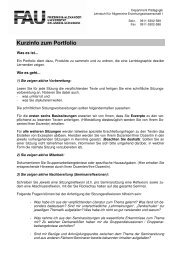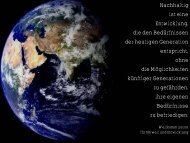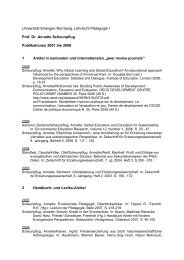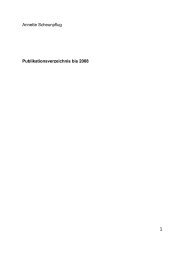ZEP - Lehrstuhl für Allgemeine Erziehungswissenschaft I
ZEP - Lehrstuhl für Allgemeine Erziehungswissenschaft I
ZEP - Lehrstuhl für Allgemeine Erziehungswissenschaft I
Sie wollen auch ein ePaper? Erhöhen Sie die Reichweite Ihrer Titel.
YUMPU macht aus Druck-PDFs automatisch weboptimierte ePaper, die Google liebt.
<strong>ZEP</strong>30. Jg. Heft 1 März 2007 Seite 212. The Gap between our ‘Radius of Impact’ and‘Radius of Moral Concern’The process of globalisation has meant that the ‘radius ofimpact’ each of us has on the world has extended massively,whether we are aware of it or not. 2Although the above extension has taken place, our ‘radiusof moral concern’ as individuals or societies has not expandedto the same extent during this period. This extension of moralconcern is critical if people in the globalised world are to livein a manner that we in the Movement regard as ‘ethical’.The movement is now asking people to expand their rangeof concern from a very small, local area or group of peopleto the whole world, and also to become motivated by issuesthat are in some cases both a little abstract and long-termistin outlook – i.e. making changes in their behaviour now inorder to provide benefits or protection for the future, or forpeople, creatures or other beneficiaries they cannot immediatelysee or do not know.It may seem that we are asking people to make a substantialshift on this point. For some it may be a big changebut for many others, living their daily lives in a way that isconsistent with ‘universal moral principles’ (which is allwe are talking about) has been a part of their lives for years.The most common way in which these universal principlesare manifested in the mainstream is in religious belief andthe moral codes of the type ‘behave in way towards alls’ (e.g. be kind to all animals) that spring from it.It can be argued however that religion is less influentialin today’s western world than in the past, and the level ofinfluence it should have is open to question anyway. For themillions of people who are not religious, there is very littleopportunity to gain moral guidance, reflect on their ownmoral principles or learn about how to put them into practice,particularly the universal moral principles that affect ourresponse to living in a globalised world. We do not seem tohave an explicit set of values as a globalised society.One of the main voices on universal values in modernsociety is that of interest groups such as those within theMovement. The moral message of these groups is howeververy much hidden, in favour of a focus on issues. Additionally,many organisations within the Movement still tend topromote one particular issue in isolation (e.g. poverty relief),which may represent only one moral value (e.g. ‘everyhuman being should have a minimum standard of living’)that an individual may hold. In contrast, our moral outlookas individuals tends to consist of a range of values ratherthan one in isolation.If people do not receive the support they need to considertheir range of values and how they might put them into actionin their lives, most will only be able to act as somewhat ineffectivemoral agents – they may be inconsistent or sporadicin their moral actions.3. Infl uences of SocietyThe first two barriers are exacerbated by the fact that manyactors in society (both organisations and individuals) havedeveloped means (some subtle, some not) of communicatingmessages in order to influence others, the most powerful ofwhich generally seek to promote and protect the status quo.In modern society, this status quo can be defined as ‘thepursuit of economic growth and profit’, under which otherfactors are only given secondary consideration – whetherthese are human welfare or the natural environment. Thisdominant ideology either possesses values that are contraryto the human and nature-centred ones that the Movementis trying to put forward, or has adopted a highly ineffectivestrategy to seek the values it shares with the Movement.The values of the dominant socio-economic system beginto be instilled in the ordinary individual in the Westernworld as soon as they are born – through sources such asthe education system through to newspapers, television,the workplace etc. – and thus most people are born intoaccepting a particular picture of how the world is and whatlife is about.Very few of us appear to have appreciated the all-encompassingway in which people are affected by these seeminglyirrelevant inputs, or the way in which the economic andpolitical orthodoxy spreads into so many social, cultural,educational and private areas of our lives. Once you ‘placeyourself within the mental worldview’ of the ordinary individual,the potential severity of the effect becomes clear. 3Consider what your mental worldview would be in theirposition – living in a world in which economic growth andconsumption are seen as the engines of a ‘good’ society. Thisunderlying assumption might affect many areas of your life,including how your education is delivered to you (e.g. witha focus on providing skills that will enable you to fulfill aparticular economic role), the ethos at your workplace, themessages you receive from various media (e.g. promotingconsumption), even how your peers relate to you (e.g. competitionto live similar lifestyles). Given these inputs, yourambitions in work, values, lifestyle, attitude towards life andvarious other factors would be confined within the parametersof the consumerist worldview. And you simply wouldn’trealise that these mental barriers existed or have a clear ideaof the other possibilities that existed beyond them.The dominant socio-economic system is therefore apowerful force in moulding the values, aspirations and behaviourof the individual in the West. The system reinforcesits values in people on an ongoing basis, all day every day,therefore it is almost impossible for the contrary messagesof the Movement to get through to many people to enablethem to even realise that there may be something wrong inthe first place – let alone to challenge their own behaviourpatterns or review the alternatives open to them.For the people who have been able to battle through the‘smokescreen’ of the modern world to the point where theywish to make changes, further obstacles lie ahead. Theymay find it difficult to locate the alternative options theywant. They are also likely to receive little support fromwider society in pursuing these options – indeed they arelikely to find regular obstacles. These will take many forms,including meeting opposition, confusion or ridicule frompeer groups or self-doubt as to whether the inconvenienceof these changes is really worth the effort for the benefitthey will bring.
















